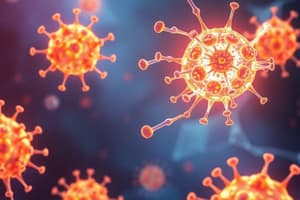Podcast
Questions and Answers
What are the two general classes of inflammatory mediators?
What are the two general classes of inflammatory mediators?
- Vasodilators and Vasoconstrictors
- Neurotransmitters and Hormones
- Cytokines and Chemokines
- Pro-inflammatory and Anti-inflammatory (correct)
What is the role of phospholipase in inflammation?
What is the role of phospholipase in inflammation?
- To decrease the activity of anti-inflammatory mediators
- To convert arachidonic acid into COX
- To increase the formation of pro-inflammatory mediators
- To convert phospholipids into arachidonic acid (correct)
How can inflammation be reduced according to the information given?
How can inflammation be reduced according to the information given?
- Turn on anti-inflammatory mediators or turn off pro-inflammatory mediators (correct)
- Increase pro-inflammatory mediators
- Increase the levels of arachidonic acid
- Decrease the activity of phospholipase
What does a balance between pro-inflammatory and anti-inflammatory mediators determine?
What does a balance between pro-inflammatory and anti-inflammatory mediators determine?
Which enzyme is primarily responsible for converting arachidonic acid into other compounds?
Which enzyme is primarily responsible for converting arachidonic acid into other compounds?
Increasing the activity of which mediators can help turn on anti-inflammatory processes?
Increasing the activity of which mediators can help turn on anti-inflammatory processes?
What part of the cell is crucial for the formation of inflammatory mediators?
What part of the cell is crucial for the formation of inflammatory mediators?
What does the enzyme phospholipase do?
What does the enzyme phospholipase do?
What is a potential consequence of using anti-inflammatory drugs like NSAIDs during training?
What is a potential consequence of using anti-inflammatory drugs like NSAIDs during training?
What is a serious risk associated with some drugs mentioned in the content?
What is a serious risk associated with some drugs mentioned in the content?
When should NSAIDs generally be used according to the content?
When should NSAIDs generally be used according to the content?
What key physiological process might be negatively impacted by the suppression of inflammation during training?
What key physiological process might be negatively impacted by the suppression of inflammation during training?
Which scenario suggests that using NSAIDs might be acceptable according to the content?
Which scenario suggests that using NSAIDs might be acceptable according to the content?
What should be the main consideration when deciding to use NSAIDs in the context of exercise?
What should be the main consideration when deciding to use NSAIDs in the context of exercise?
What is a possible effect of chronic use of NSAIDs as indicated in the content?
What is a possible effect of chronic use of NSAIDs as indicated in the content?
Why is inflammation a necessary response after intense exercise?
Why is inflammation a necessary response after intense exercise?
What could happen if NSAIDs are administratively taken post-exercise in a training phase?
What could happen if NSAIDs are administratively taken post-exercise in a training phase?
What is a characteristic effect of reactive oxygen species as mentioned in the content?
What is a characteristic effect of reactive oxygen species as mentioned in the content?
What is the primary effect of COX-1 inhibition?
What is the primary effect of COX-1 inhibition?
Which prostaglandin is primarily associated with COX-2 activity?
Which prostaglandin is primarily associated with COX-2 activity?
What potential cardiovascular effect is associated with strong COX-2 inhibitors?
What potential cardiovascular effect is associated with strong COX-2 inhibitors?
Aspirin is typically categorized as which type of COX inhibitor?
Aspirin is typically categorized as which type of COX inhibitor?
Which of the following is a key difference between COX-1 and COX-2?
Which of the following is a key difference between COX-1 and COX-2?
What is the main concern when inhibiting COX-1 in terms of side effects?
What is the main concern when inhibiting COX-1 in terms of side effects?
Which drug is known to have a higher risk of gastrointestinal side effects due to stronger COX-1 selectivity?
Which drug is known to have a higher risk of gastrointestinal side effects due to stronger COX-1 selectivity?
What is generally true about NSAIDs with strong anti-inflammatory properties?
What is generally true about NSAIDs with strong anti-inflammatory properties?
What happens when the balance between COX-1 and COX-2 is disturbed?
What happens when the balance between COX-1 and COX-2 is disturbed?
Which of the following describes the general role of COX-2?
Which of the following describes the general role of COX-2?
How do COX-1 selective drugs generally affect cardiovascular risk?
How do COX-1 selective drugs generally affect cardiovascular risk?
What is a trade-off when using NSAIDs that are effective against inflammation?
What is a trade-off when using NSAIDs that are effective against inflammation?
In a pro-inflammatory environment, what can arise from COX-1 metabolism?
In a pro-inflammatory environment, what can arise from COX-1 metabolism?
Which of the following is true about NSAIDs that are more COX-2 selective?
Which of the following is true about NSAIDs that are more COX-2 selective?
What is the primary function of glucocorticoids in the inflammatory pathway?
What is the primary function of glucocorticoids in the inflammatory pathway?
How do COX inhibitors decrease inflammation?
How do COX inhibitors decrease inflammation?
What type of medications are commonly associated with COX inhibitors?
What type of medications are commonly associated with COX inhibitors?
What distinguishes COX-1 from COX-2 in terms of their physiological roles?
What distinguishes COX-1 from COX-2 in terms of their physiological roles?
Which enzyme is responsible for converting phospholipids into arachidonic acid?
Which enzyme is responsible for converting phospholipids into arachidonic acid?
What effect does thromboxane A2 generally have in blood vessels?
What effect does thromboxane A2 generally have in blood vessels?
What is a common misconception about the effects of COX-1 and COX-2?
What is a common misconception about the effects of COX-1 and COX-2?
What mechanism do NSAIDs primarily use to exert their effects?
What mechanism do NSAIDs primarily use to exert their effects?
Which characteristic is true of COX-2 during inflammation?
Which characteristic is true of COX-2 during inflammation?
Which statement accurately describes the role of prostaglandins in the body?
Which statement accurately describes the role of prostaglandins in the body?
What primary role does cyclooxygenase serve in relation to arachidonic acid?
What primary role does cyclooxygenase serve in relation to arachidonic acid?
What is a potential effect of long-term COX-2 activity?
What is a potential effect of long-term COX-2 activity?
Which of the following mediators is primarily responsible for causing vasodilation?
Which of the following mediators is primarily responsible for causing vasodilation?
What physiological effect does thromboxane have?
What physiological effect does thromboxane have?
When arachidonic acid is processed by COX-1, which product is formed that has opposing effects in different tissues?
When arachidonic acid is processed by COX-1, which product is formed that has opposing effects in different tissues?
What is the primary difference between steroid medication and NSAIDs?
What is the primary difference between steroid medication and NSAIDs?
What is the primary function of leukotrienes produced from arachidonic acid?
What is the primary function of leukotrienes produced from arachidonic acid?
What outcome does increased vascular permeability typically lead to?
What outcome does increased vascular permeability typically lead to?
What role does phospholipase play in the inflammatory process?
What role does phospholipase play in the inflammatory process?
How does the balance of pro-inflammatory and anti-inflammatory substances affect inflammation?
How does the balance of pro-inflammatory and anti-inflammatory substances affect inflammation?
Why are corticosteroids effective in treating inflammatory conditions?
Why are corticosteroids effective in treating inflammatory conditions?
Which enzyme is involved in converting arachidonic acid specifically into leukotrienes?
Which enzyme is involved in converting arachidonic acid specifically into leukotrienes?
What effect do prostacyclins have in inflammatory processes?
What effect do prostacyclins have in inflammatory processes?
What is one of the main takeaways regarding arachidonic acid and inflammation?
What is one of the main takeaways regarding arachidonic acid and inflammation?
What is the primary effect of 12-lipoxygenase in the context of inflammation?
What is the primary effect of 12-lipoxygenase in the context of inflammation?
What physiological function is linked to prostaglandins?
What physiological function is linked to prostaglandins?
What mediators are produced primarily as a response to the action of the cyclooxygenase enzyme on arachidonic acid?
What mediators are produced primarily as a response to the action of the cyclooxygenase enzyme on arachidonic acid?
Which statement is true regarding the interaction of phospholipase with membrane phospholipids?
Which statement is true regarding the interaction of phospholipase with membrane phospholipids?
Flashcards are hidden until you start studying
Study Notes
Inflammatory Mediators Overview
- Chemical molecules regulate inflammation, classified into pro-inflammatory (promote inflammation) and anti-inflammatory (reduce inflammation) mediators.
- The balance between these mediators determines the inflammatory state of the body.
Mechanisms of Action
- To reduce inflammation:
- Increase anti-inflammatory mediator activity.
- Decrease pro-inflammatory mediator formation.
- Process initiated at the cell membrane phospholipids, converted to arachidonic acid by the enzyme phospholipase.
Arachidonic Acid Pathways
- Arachidonic acid is converted by cyclooxygenase (COX) and lipoxygenase (LOX) enzymes into various inflammatory mediators.
- COX enzymes:
- COX-1: Involved in normal physiological functions and produces prostaglandins (PG) and thromboxanes.
- COX-2: Induced during inflammation, primarily produces pro-inflammatory mediators.
Specific Roles of Enzymes
-
Cyclooxygenase (COX) Pathway:
- Converts arachidonic acid into prostaglandins (e.g., PGD2, PGE2), thromboxanes (TX), and prostacyclins (PGI2).
- Prostaglandins cause effects like vasodilation and increased vascular permeability.
- Thromboxanes promote platelet aggregation and vasoconstriction.
-
Lipoxygenase (LOX) Pathway:
- Converts arachidonic acid into leukotrienes.
- Leukotrienes play roles in inflammation and bronchoconstriction.
Pharmacological Management
-
Strategies to manage inflammation include inhibiting enzymes involved in arachidonic acid metabolism.
-
Corticosteroids/Glucocorticoids:
- Inhibit phospholipase to prevent the formation of arachidonic acid, thus reducing inflammation.
-
Non-Steroidal Anti-Inflammatory Drugs (NSAIDs):
- Inhibit COX enzymes, specifically targeting COX-1 or COX-2 to reduce inflammation while managing potential side effects.
COX Selectivity and Side Effects
- COX-1 is considered a housekeeping enzyme, essential for maintaining normal physiological functions (e.g., gastrointestinal protection, platelet function).
- COX-2 is more active during inflammation, producing pro-inflammatory mediators.
- Inhibition of COX-1 can lead to gastrointestinal issues and impaired platelet function.
- Inhibition of COX-2 can increase the risk of cardiovascular adverse effects but provides stronger anti-inflammatory benefits.
NSAIDs Classification
- Drugs vary in COX selectivity:
- COX-2 selective NSAIDs have strong anti-inflammatory effects but are associated with increased cardiovascular risks.
- COX-1 selective NSAIDs may help manage cardiovascular risks but carry gastrointestinal side effect risks.
Summary of Risk Management
- The choice of NSAID should balance anti-inflammatory efficacy with the risk of cardiovascular and gastrointestinal side effects.
- Understanding the specific roles of COX-1 and COX-2 will inform better therapeutic strategies for inflammatory conditions.### NSAIDs and Risks
- COX-1 specific NSAIDs have a high risk of gastrointestinal side effects but a low risk for cardiovascular complications.
- Acknowledge that "low risk" does not equate to "no risk"; exceptions exist, particularly concerning certain patient populations.
- Potential cardiovascular risks include increased blood pressure that could lead to thrombosis, myocardial infarction, or cardiac death through blood clots.
- Gastrointestinal risks may start with minor symptoms but can escalate to serious complications like bleeding and ulcers.
Inflammation, Exercise, and Recovery
- Reactive oxygen species have both beneficial and detrimental roles in relation to exercise adaptation.
- Intense exercise, especially eccentric types like running and weight training, can lead to muscle damage and inflammation.
- Anti-inflammatory drugs like NSAIDs may alleviate discomfort following exercise but can also hinder repair and adaptation by suppressing necessary inflammatory responses.
- Using NSAIDs in training can diminish the training stimulus, hindering strength and fitness gains as inflammation is crucial for muscle repair.
Usage Guidelines for NSAIDs
- During high training phases, the inflammatory response should not be suppressed; it is essential for adaptation and becoming stronger.
- In competitive phases, when performance optimization is required (e.g., post-semi-final events), NSAIDs may be beneficial to minimize inflammation and muscle damage.
- General advice is to avoid anti-inflammatories during training, but consider them when competition is imminent, especially if inflammation could impair future performance.
- Exceptions may arise, such as in cases of inflammatory-related injuries where transient use of NSAIDs may be appropriate.
Studying That Suits You
Use AI to generate personalized quizzes and flashcards to suit your learning preferences.



